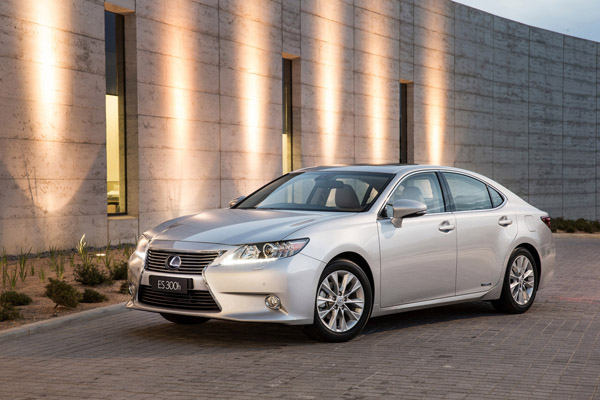
2013 Lexus ES300h
Late in 2013 a new generation Lexus ES was built on its own unique platform, previous models shared some underpinnings with Toyota models. Frontal styling was distinctly Lexus with its aggressive arrow-head spindle grille.
The smooth, near silent ride and high-quality finish that had really impressed people since the earliest days of the Lexus LS400 was continued in the ES line. Perhaps it wasn’t quite as supremely smooth as its big brother, but the ES cost considerably less so has appealed to many. Thus, there are now quite a few on the secondhand market, given you a good choice to select from.
This Lexus ES was offered as pure petrol powered by a 3.5-litre V6 or petrol/electric hybrid with a 2.5-litre Atkinson Cycle four-cylinder petrol engine and nickel-metal-hydride batteries.
Potential Lexus buyers are often tech savvy people and quite a few hybrids have been sold since day one
The ES makes no pretense at being a sports machine. Handling is on the soft side as the concentration is on comfort. Interior room is good without being outstanding and you may not be able to transport four tall people without some compromising front to rear on the driver’s side.
In August 2015 the ES was given an extensive makeover. Visually it took cues from the company’s L-Finesse design language, with a pinched-waist grille that was wider and taller. New headlamps, daytime running lights and reflectors created a bolder look.
2015 Lexus ES350
At the back, sections of the lamp cluster were enlarged and the lower bumper broadened with the bootlid garnish now integrated into the lights and extended to the clear lenses. Sportier looking wheels completed the package.
The biggest change is an invisible one, the use of paint that has Lexus’s self-restoring surface which lets the paint’s clear outer coating ‘heal’ itself from minor damage.
This ES had the Lexus Safety System+ which combined a pre-collision system, lane departure warning, automatic high beam lighting and active cruise control.
Over the years the number of Lexus dealerships in Australia has increased significantly. The company began its operations in the major capital cities, but later expanded into larger country cities as well. Senior technicians at Toyota dealerships can carry out work if you’re not in an area serviced directly by Lexus.
It comes as no surprise that we recommend servicing and repairs should be left to professional mechanics.
Insurance premiums are generally moderate, reflecting the type of conservative driver to whom this Lexus appeals.
2018 Lexus ES300h
WHAT TO LOOK FOR
Having done your own initial checks, we strongly recommend calling in either a Lexus specialist or a senior inspector from a motoring association.
Get a quote for even the most minor faults as these can be surprisingly expensive at times.
Make sure the engine starts quickly and idles smoothly, indeed, virtually imperceptibly.
Check the automatic transmission operates quietly and smoothly.
If you haven’t driven a hybrid before you’re likely to be surprised the engine doesn’t start when you turn the car on. Instead, the electric motor sits there silently and the car moves off on electric power. The petrol engine kicks in as required.
Feel for steering that is precise in its operation and works smoothly. Listen for unusual noises and look for the slightest sign of anything out of the ordinary.
HOW MUCH?
Look at paying from $11,000 to $17,000 for a 2013 Lexus E350 Luxury or 2014 E300h Sports Luxury; $16,000 to $23,000 for a 2014 E300h Luxury; $18,000 to $25,000 for a 2015 ES350 Luxury; $24,000 to $32,000 for a 2016 ES300h Sports Luxury; $26,000 to $34,000 for a E3r0 Luxury; $30,000 to $41,000 for a 2018 ES300h Sports Luxury; $35,000 to $46,000 for a 2019 E300h F Sport; and $42,000 to $55,000 for a 2020 E300h F Sport + EP.
CAR BUYING TIP
Spend as much time looking for the best price on insurance and finance as you do on the car itself.
RECALLS: To browse recalls on all vehicles go to the ACCC at: www.productsafety.gov.au/products/transport/cars/